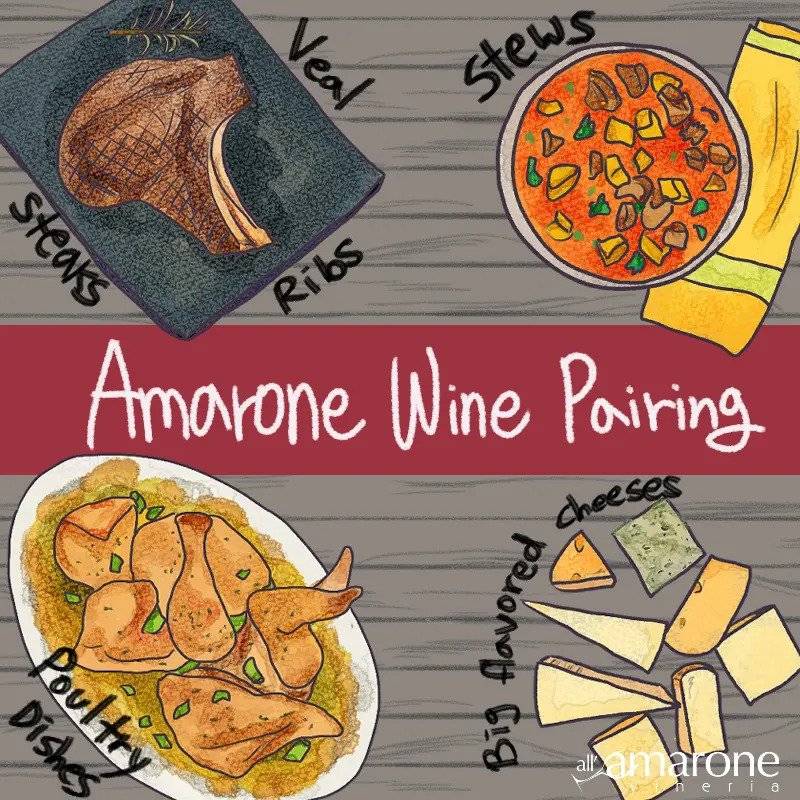A useful guide to Italy's famous Red - Amarone della Valpolicella
Called the King of Wines, Amarone is one of the best-known names among all Italian wine, a label under which you will find some of Italy’s most prestigious and valued reds.
The famous Italian red wine, Amarone is produced in the Veneto region of Italy. Amarone is a luxurious and bold wine that is highly prized for its rich and complex flavor profile. This wine is made from dried grapes, which are left to dry for several months before being crushed, fermented, and aged. The drying process concentrates the flavors and sugars in the grapes, resulting in a wine that is full-bodied, intensely flavored, and high in alcohol content.
The history of Amarone dates back to the ancient Romans, who are believed to have produced a wine similar to Amarone using the appassimento method. However, Amarone only became a recognized wine in the 20th century. The modern version of Amarone was first produced by the Bolla winery in the 1950s and quickly gained popularity due to its unique taste and high quality. Today, Amarone is considered one of Italy's most prestigious wines and is highly sought after by collectors and wine connoisseurs around the world.
Unique production method

The appasimento process involves carefully selecting the best grapes and then partially drying them on racks like the ones above, before pressing them to make wine.
The appasimento process distinguishes Amarone from other wines. It involves carefully selecting the best grapes and then partially drying them before pressing them to make wine. This process is labor intensive and results in a lower wine yield, making Amarone a rarer and more valuable product.
The drying process concentrates the sugars and aromas in the grapes and results in a wine with a high alcohol content and a full and intense flavour. The grapes are usually dried for several months, either on racks or in special drying chambers, and this process removes some of the water from the grapes, resulting in a more concentrated wine.
The impact of appassimento on the taste and body of the wine is significant. The concentrated sugars and flavors give Amarone a rich and full-bodied flavor profile, with aromas of dark fruits such as cherry and plum, as well as hints of spice, tobacco and chocolate. The high tannin content gives Amarone a robust and structured mouthfeel, and the long aging process helps develop the wine's complex flavors and aromas and soften the tannins, making the wine more approachable and balanced.
Overall, Amarone's unique production method, using the appassimento process, is what sets it apart from other wines and contributes to its full-bodied, intense and complex flavor profile.
High quality ingredients
The quality of the grapes used to make Amarone is crucial to the overall quality of the wine. Amarone is made from a blend of grape varieties, including Corvina, Rondinella, and Molinara, and these grapes are grown in the Valpolicella region of the Veneto. The Valpolicella region is known for its well-draining, calcareous soils and its warm, sunny climate, which are ideal for growing high-quality grapes.
The grapes used to make Amarone are carefully selected and hand-picked at the peak of ripeness, and this ensures that the grapes are of the highest quality. The ripe grapes are then subjected to the appassimento process, which concentrates the sugars and flavors in the grapes, resulting in a wine with a full-bodied, intense flavor profile.
In addition to the quality of the grapes, the soil and climate of the Valpolicella region also play a significant role in the quality of Amarone. The region's well-draining, calcareous soils and warm, sunny climate provide the ideal growing conditions for the grapes, and this contributes to the wine's unique flavor and character.
Overall, the combination of high-quality grapes and the ideal soil and climate of the Valpolicella region are key factors in the production of Amarone, and they contribute to the wine's exceptional quality and flavor.
Long aging process
Amarone is known for its long aging potential and is usually aged for a minimum of three years before being released on the market. During this time, the wine undergoes a number of chemical and physical changes that add to its depth and complexity. The aging process helps develop the flavors and aromas of the wine, and it also helps soften the tannins, making the wine more approachable and balanced.
In addition to the minimum three-year aging requirement, Amarone has the potential to mature much longer. Some Amarone wines can age up to 10 years or more, during which time the wine continues to evolve and improve. As Amarone ages, the flavor and aroma become more complex and nuanced, and the wine takes on a smoother, more refined mouthfeel.
Amarone's long aging potential is one of the things that sets it apart from other wines and is a key factor in the wine's high quality and value. This aging and maturing potential makes Amarone a wine that can be stored and enjoyed for many years and is one of the reasons Amarone is considered the "King of Wines".
Complex and nuanced flavor profile
Amarone is known for its complex and nuanced flavor profile, and this aspect of the wine sets it apart from other red wines. Amarone wines are generally rich and full-bodied, with aromas of dark fruits such as cherries and plums, as well as hints of spice, tobacco and chocolate. These flavors are the result of the wine's unique appasimento production method and the high-quality grapes used in its production.
Characteristic of Amarone are the aromas of dark fruits, spices, tobacco and chocolate, which give the wine its unique and complex character.
In addition to its complex flavor profile, Amarone is known for its high tannin content and robust mouthfeel. Tannins are compounds present in the skins, seeds and stems of grapes and give the wine its structure and astringency. Amarone is high in tannins, which give it a robust and structured mouthfeel and contribute to its long aging potential. The tannins in Amarone also help balance the flavors of the wine and provide a long, lingering finish.
All in all, the complex and nuanced flavor profile of Amarone, with aromas of black fruits, spices, tobacco and chocolate, combined with the high tannin content and robust palate, make it a highly sought-after wine by wine lovers worldwide.
Reasons why Amarone wine is expensive
A final tip for finding good wine at a good price is to seek wine recommendations from trusted sources. There are many resources available to help you find a good price when buying wine, and seeking recommendations can be a great way to find great wine at good prices.
For example, you can ask a sommelier or a wine expert for advice. Sommeliers are trained professionals with knowledge of wine and can make recommendations based on your preferences and budget. Reading wine reviews from trusted sources, such as wine magazines or websites, is also a good way to find recommendations. These reviews can provide valuable insight into the quality and value of different wines.
In general, seeking wine recommendations from reputable sources is a great way to find a good price when buying wine. By asking a sommelier or reading reviews from reputable sources, you can find great wine at good prices and enjoy a variety of high-quality wines.
Versatility with food pairing

Photo Credit: shop.allamarone.com
Amarone is known for its versatility and can be enjoyed with a wide variety of dishes. Its full-bodied and intense aromatic profile makes it an excellent wine to accompany rich and hearty dishes such as roasts, grilled steaks and game. The wine's high tannin content and robust mouthfeel also make it a good complement to hard, strong cheeses, as the tannins help balance the flavors and provide a long, lingering finish.
In addition to its versatility with side dishes, Amarone is also an excellent wine to drink neat. Its complex and nuanced aromatic profile is perfect for sipping and savoring, and it is a wine that can be enjoyed as an aperitif or as a drink on its own.
Overall, Amarone's versatility, both with food pairing and as a wine on its own, is one of the things that makes it so popular and sought after by wine enthusiasts around the world. Its full and intense flavor profile and high tannin content make it a wine that can be enjoyed with a wide variety of dishes, and its complex and nuanced flavor profile make it a great wine to enjoy on its own.
Valpolicella Ripasso
The Amarone production method yields a vinous byproduct, of sorts. Rather than throwing away the dried grape skins (or distilling them into grappa), astute winemakers employ them to add depth and complexity to their typical Valpolicella wines. The wine and grape skins combine for a second fermentation, during which tannins and phenolic compounds are leached into the wine, resulting in Valpolicella Ripasso, lovingly called Baby Amarone by the lovers of the Veneto wines.







